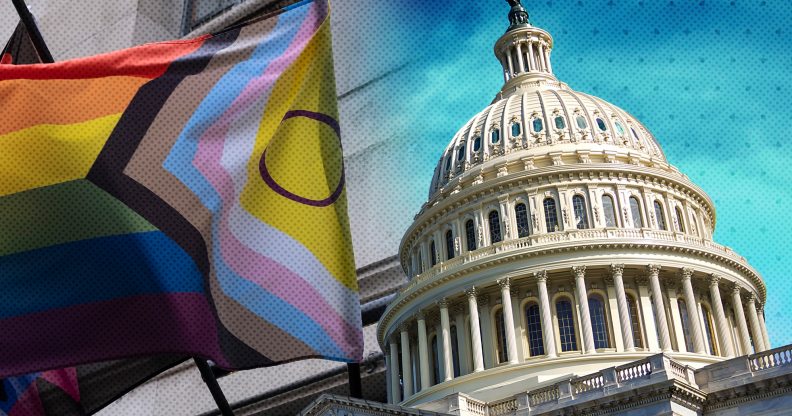Joe Biden joins LGBTQ+ celebrations after Senate votes for same-sex marriage

The US Senate will vote again for the Respect For Marriage Act. (Getty)
The US Senate has voted in favour of protecting same-sex marriage with the Respect For Marriage Act, with even some Republican lawmakers showing their support.
The Act passed through the Senate with 50 Democrats and 12 Republicans voting in favour on Wednesday (16 November).
Because of a last-minute amendment to protect religious liberty, added in order to win Republican support, the Act will now return to the House for final vote, which could come as soon as this week.
If passed, the Act will repeal the Defense of Marriage Act, which defined marriage as between a man and a woman. The Act was nullified by the Supreme Court in its 2015 Obergefell v Hodges ruling, but there are fears the court could revisit and overturn this.
The Act would protect same-sex marriage as well as interracial marriage.
President Joe Biden welcomed the vote, saying that it sends “a strong message that Republicans and Democrats can work together to secure the fundamental right of Americans to marry the person they love.”
Chuck Schumer, who reportedly announced that his daughter and her wife are expecting a baby during proceedings, also celebrated the bill, saying on Twitter: “No one in a same-sex marriage or an interracial marriage should have to worry if their marriage will be invalidated.”
Love is love and Americans should have the right to marry the person they love. Today’s bipartisan Senate vote gets us closer to protecting that right.
The Respect for Marriage Act protects all couples under law – I urge Congress to send the bill to my desk so I can make it law.
— President Biden (@POTUS) November 16, 2022
Although the bill has not yet been signed into law, LGBTQ+ Americans are celebrating the legislation moving through the steps it needs to be put in place.
Media Matters’ Ari Drennen said: “The Respect for Marriage Act is far from perfect. But as a closeted teenager who watched George W Bush campaign on a constitutional amendment to ban gay marriage, I never thought I’d see a bill to protect same-sex marriage pass by the Senate with a filibuster-proof majority.”
The Respect for Marriage Act is far from perfect. But as a closeted teenager who watched George W Bush campaign on a constitutional amendment to ban gay marriage, I never thought I'd see a bill to protect same-sex marriage pass by the Senate with a fillibuster-proof majority. pic.twitter.com/Ddw6j9E1et— Ari Drennen ? (@AriDrennen) November 16, 2022
Art critic Hrag Vartanian said: “You have no idea how much this will make many people, particularly immigrant spouses, feel a sense of relief. I want to cry.
“If you asked my teenage self if we’d ever see this I would’ve said it might take 100 years.”
Senate Minority Leader Mitch McConnell was heavily criticised for voting against the bill, with many noting that he himself is in an interracial marriage with wife Elaine Chao.
“I have no words. Are you too afraid to ask your wife for a divorce?” one social media user said.
Another argued: “There’s nothing more Mitch McConnell than voting AGAINST interracial marriage while being in an interracial marriage.”
Senate Minority Leader Mitch McConnell has voted NO to advancing the Respect for Marriage Act, which would protect his own interracial marriage to Elaine Chao under federal law. pic.twitter.com/UleHMxcHdp— Pop Crave (@PopCrave) November 16, 2022
Both same-sex marriage and interracial marriage are currently legal in the US, with same-sex marriage legalised following the 2015 Obergefell v Hodges Supreme Court ruling, and interracial marriage legalised with the passing of the 1967 Loving v Virginia ruling.
After the decision to overturn Roe v Wade in June, however, LGBTQ+ activists are worried that the US Supreme Court could target same-sex marriage next.
The Act would force states to recognise same-sex marriages performed in other states where marriage equality is legal. It would not, however, force states to conduct same-sex marriages if they didn’t want to, according to the ACLU.
Human Rights Campaign’s incoming president Kelley Robinson said in a statement about the vote: “The devastating United States Supreme Court decision to overturn Roe v Wade was a clear reminder that we are just one Supreme Court decision away from losing too many of our hard fought for rights.
“568,000 same-sex married couples across America… deserve to know that the federal government has no intention of going back to the dark days of DOMA [the Defence of Marriage Act 1996, which defines marriage as one man and one woman].
“The Respect for Marriage Act is an essential piece of legislation that affirms that every marriage, and every family, is valid and beautiful.
“Today’s strong bipartisan vote of 62-37 for cloture is an incredible victory that cannot be taken lightly – this vote was the bill’s biggest procedural roadblock, and now we steer our focus toward to the Senate final vote on this historic legislation. Our work is not done.”
The Independent reported that a final vote on the bill could come as early as Thursday (17 November).

